Course Overview: Product Design Mr Owens
Design & Technology is taught on a Carousel system; the carousel has built in flexibility which guarantees pupils have full experiences in all areas of Design & Technology before they start the option process. The aim of our product design curriculum is for pupils to study a modern technological curriculum which is relevant to pupil’s lives in the 21st century.
The course is challenging with the aim of creating students with a high level of life/employability skills.
Product design 1 is taught for 2 hours a week for half of the year. For the second half of the year pupils will study Creative technology. The aim of this course is for pupils to become resilient problem solvers. During the course they will learn about mechanisms, 3d printing, lazer cutting, bio mimicry, Smart materials and more traditional materials such as wood, metal and plastic. Pupils will learn to use a wide range of tools and machinery.
Sustainability and designing with the environment and people in mind is at the core of our teaching.
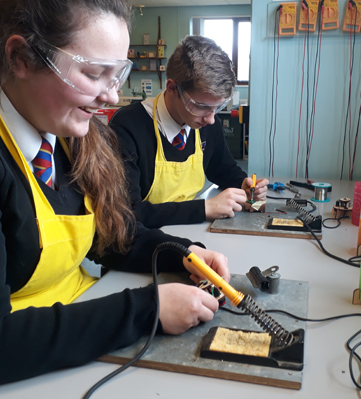
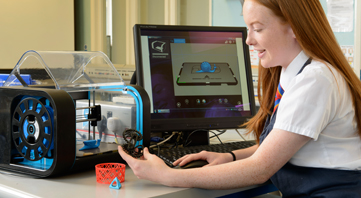
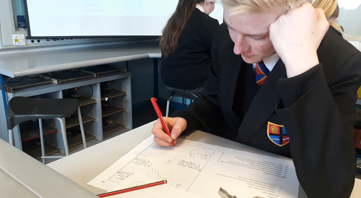
Key Stage 3
Half Term 1
The designed world; Our influence on the planet. Are all products good products. Designing for your future.
Introduction to Automata; What is an automata, how does it work, making the base and the character.
Introduction to the workshop; Learn to use the sanding machine, pillar drill, scroll saw and a range of hand tools.
Half Term 2
How the automata works; Fitting the cams and cam followers, making the product work.
3D printing and Lazer cutting; Make the lazer cut parts and the 3D printed washer.
Mechanisms; Working out the speed of mechanisms.
Half Term 3
Bio mimicry; What is bio mimicry and where do we use it in design.
Smart materials; Experiment with a range of Smart materials.
Circular Economy; Designing for a sustainable world.
Product Design; Design and make a phone holder for charging.
Challenge work; A series of practical problem solving challenges will be set.
Course Overview: Product Design Mr Horvath
Product design2 is taught for 2 hours a week for half of the year. For the second half of the year pupils will study Cooking and Nutrition. The aim of this course is for pupils to become resilient problem solvers. During the course they will be introduced to Electronics, design, 3D design manufacturing and the work of modern designers.
Pupils will also learn about the LT transfer process, circuit testing and product assembly, 3D CAD process as well as learning how to present ideas in 3D isometric drawing and rendering.
Half Term 1
Flashing Door Hanger Project; Introduction into simple electronic circuits and components.
Foundation in workshop health and safety requirements.
Pupils learn new skills in soldering electronic components onto a PCB as well as practicing to joining wires.
Developing resilience to solve and correct circuit problems.
Half Term 2
To develop a range of designs in powerpoint (CAD) and develop one design for manufacture for an end user.
Using LIT process, pupils transfer their designs onto their plywood hanger fronts before using workshop pillar drill to drill holes and then assemble their product.
Half Term 3
Using 3D CAD, pupils model simple products, add materials and global lights to create realistic products.
Building on pupils 3D CAD skills, opportunities exist to 3D print simple products.
Ideation; How ideas for products can be generated, developed and communicated.
Product Analysis; What can we learn by looking at existing products? How could this inform new designs?
Course Overview: Product Design Mr Horvath
https://www.eduqas.co.uk/qualifications/design-and-technology/gcse/
Course Overview: Product Design
Design and Technology (Product Design) is an inspiring, rigorous, practical subject. Using creativity and imagination, pupils design and make products that solve real and relevant problems. Pupils are taught the knowledge, understanding and skills needed to engage in the process of designing and making. Pupils will apply science and mathematics when designing and making products. All projects will reflect the modern fast moving world of technology. Pupils will be encouraged to use a wide range of design and making methods including Electronics, Computer Aided design, lazer cutting and 3D printing.
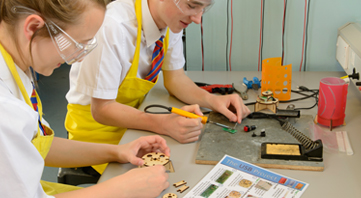
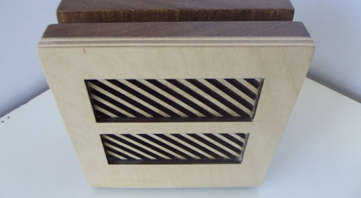
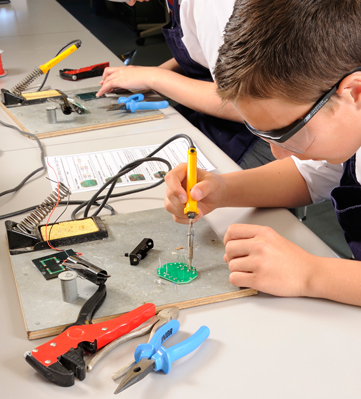
Year 9 Product Design Transition Year
Half Term 1
Year 9 is the third year of Product design and a transition into the technical aspects of future studies in this area. The PD GCSE will be studied fully in the fourth and fifth years of the course.
Moodlight Project:
Introduction into 2d CAD / CAM
CAD fundamentals / Basic skills – trace task
Workshop skills – marking out and construction of the light base.
Half Term 2
2d CAD ‘Architect’ module. Pupil’s learn how to draw precisely and produce simple views of a domestic house.
2d ‘Architect’ advanced – In this module pupils will accurately produce a house plan and then using additional CAD tools, create a ‘professional’ house plan.
Half Term 3
Google sketchup extension tasks.
Google sketchup advanced.
CAM project using the 3D printer.
Half Term 4
Ideation and design communication module.
Half Term 5
Architecture module:
In the style of ‘Architect’ research.
Product 3D design and manufacture influenced by personal research.
Half Term 6
Extended biomimicry and sustainable design project.
Year 10 GCSE Product Design
Half Term 1
Perspective drawing skills. Pupils will learn how to draw 1 point and 2 point perspective drawing techniques.
Half Term 2
Perspective drawing extension. Approaches to freehand sketching and rendering.
Pupils design and communicate a range of products in 3D.
Half Term 3
Laminated keyring project.
Design and manufacture a high quality keyring in hardwood that incorporate wood veneers.
Half Term 4
Mechanisms – theory.
Industrial processes – theory.
Materials – theory
Woods
Plastics
Metals
Half Term 5
Passive acoustic speaker prototype project.
Half Term 6
GCSE NEA project introduction & research.
Year 11
Half Term 1
GCSE NEA project introduction & research.
Half Term 2
GCSE NEA project practical work.
Half Term 3
GCSE NEA project practical work.
Half Term 4
Exam theory / revision.
Course Components
The GCSE course is assessed by 40% final exam and 60% design and make coursework. Year 10 pupils will work on a series of projects which will develop both their design and making skills.
Projects will include
Material and Practical skills development; by working with a wide range of materials and tools / equipment pupils will develop and practice their workshop skills.
Electronics; this element of the course will give pupils the skills needed to confidently design and make both traditional component based circuits and programmable chips.
Computer aided design; pupils will continue to develop their designing skills including the use of a variety of 3D design packages.
Computer aided manufacture; pupils will become confident in their use of 3D printing and lazer cutting.
Problem solving; good design needs good problem solving. Through a series of challenges pupils will learn to take risks and understand that mistakes and failure can be used positively when trying to solve original problems.
During year 11 pupils will be set a piece of coursework by the exam board. This project will require pupils to research, develop and make an original project which meets a specific need.
The exam will test pupils understanding of materials, processes and environmental issues related to designing and making. All exams will include the application of science and mathematics.
Course Information
Course Name: Design and Technology
Qualification Type: GCSE
Awarding Body: Eduqas
Specification code:C600Qs
After school clubs are provided for keen students who wish to stretch their abilities. Catch up and support is also offered on a one to one basis where necessary. Some of the support sessions, clubs and activities offered are:
STEM Engineering club
3D printing Club
Brunel award competition
Yr 11 Coursework club


